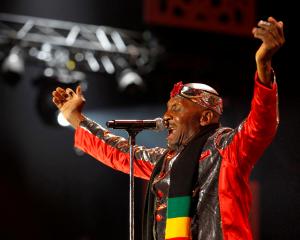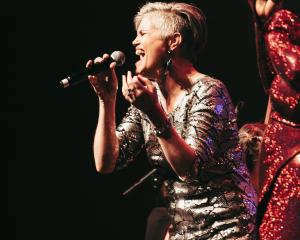Kimbra finds herself at a crucial stage in her career, the second album. The Grammy Award-winning New Zealand singer discusses inspiration, collaborations and farm-inspired funk with Shane Gilchrist.
Kimbra, or Kimbra Lee Johnson to those who might know her from her previous life growing up in Hamilton, sometimes wishes she were better at delegating.
If she were, the Grammy Award-winning New Zealand pop singer probably wouldn't be so tangled up in aspects of the music business that, to some, might seem extracurricular.
Then again, that would leave her less involved in fun and empowering processes such as honing a stylistic vision or making a video.
Take her hands-on approach to the video for new single '90s Music, a joyous grab-bag that is both a homage and send-up of some of that era's most memorable clips, ranging from Missy Elliott to Bjork and, yes, Aqua, as her chorus repeats the hook: ''MJ and Mariah/Nirvana and Aaliyah/R. Kelly and Mary Blige/TLC and Left Eye''.
''The song already had so much imagery associated with it, so I brought along a whole lot of images for it and created storyboards and styling ideas,'' Kimbra explains via phone from Los Angeles, where she has been based for the past 18 months.
''Doing a music video is like a performance. I need to have that personal connection with the audience; so that means being closely involved with the director to get the idea of the song across.
''I think at some point I will have the ability to completely hand over something to others, but I want to be involved at this point.''
That's hardly surprising given Kimbra finds herself at a crucial stage in her career. Having signed a worldwide deal with Warner Bros Records in the United States in 2010, she is poised to release her second album, The Golden Echo.
The 24-year-old attracted worldwide attention via her collaboration on Australia songwriter Gotye's hit Somebody That I Used to Know, which topped Billboard's Hot 100 chart in 2012, was the best-selling song of that year in the United States (more than 13 million copies) and earned her and Gotye two Grammy Awards (Record of the Year and Best Pop Duo/Group) last year.
How do you better that? Surround yourself with sheep.
Seriously. The livestock belongs to her landlady, who owns a farm in the Silver Lake neighbourhood of Los Angeles. It's a location Kimbra says is both inspiring and grounding.
''The day after the Grammys, I did interviews outside on the farm with about 20 chickens running around my feet and sheep and sheepdogs out the back.
''I have made decisions in my life that have forced me to stay in touch with a more contemplative, spiritual side. For me, the most important thing is having a lifestyle that supports my creative instincts. I mean, I live on a farm, man.
''I don't completely avoid the craziness of showbiz life and there are songs about that on the album, but I think it helps to structure my life in this way.''
The Golden Echo follows Kimbra's debut album Vows; released in 2011 (and rereleased 10 months later with an additional EP comprising six songs), Vows reached No1 in New Zealand and No 4 in Australia (she was living in Melbourne at the time).
The new album continues Kimbra's fascination with electro-pop and skewed funk, but she ups the ante dramatically, merging her passion for experimental bedroom recordings with Prince-like electro-funk, disco and minimalist hip-hop, sometimes in the same song. Like its aforementioned video, '90s Music distils the overriding ethos of Kimbra's album: it's highly playful, at times tongue-in-cheek, yet there is a muscular aspect to it as well.
Kimbra likes the observation.
''I'm pleased you picked up on that. I hope people do see the joy in the album, but if they listen deeper to it they will take away more.
''I get very excited by the idea of starting a song in one place and ending somewhere else. To feel slightly uncomfortable about something requires being open to the music. People are intrigued, wondering what might come next.''
To be released on Friday, August 15, The Golden Echo clearly benefits from Kimbra's growing confidence as a songwriter, musician, programmer and singer. But equally significant are the people she invited along for the ride.
Enter producer Rich Costey. On Kimbra's ''dream list'' of collaborators since she was 15, Costey is better known for his work with guitar-based bands, including Foster The People, Interpol and Muse, ''but that brought a colour as well'', she explains. Another idol of hers, Daniel Johns, of Australian outfit Silverchair, also played a key hand in at least four songs.
''There were a bunch of songs I'd partly written on the road before I even went into collaborations. Some of the songs were sketched out with a band before I moved from Melbourne to Los Angeles ... That was before the Grammy's success with Gotye.
''Then when I got to LA, I decided to stay. I found it quite inspiring. At the start, it was a case of throwing stuff against the wall and seeing what sticks,'' Kimbra explains.
''I don't know if I'd describe it as the album I've always had in my head. I have about 30 albums in my head. Things start to build from threads.
''I think you have to have a certain level of self-belief to see an idea through. If you are constantly second-guessing every melody or idea that comes up, that could be quite crippling.
''That's not to say I don't have self-doubt. I think anyone who has worked on one song for several weeks will start to question its worth. But that's when other people help.''
And what people: Kimbra's guest list at Burbank's Eldorado Studios included drummers John ''JR'' Robinson, who has recorded with Michael Jackson, Madonna and Daft Punk, and Matt Chamberlain, whose credits include Pearl Jam and Soundgarden; singers John Legend and Bilal; guitarists Matthew Bellamy (Muse), Michael Shuman (Queens Of The Stone Age) and Omar Rodriguez-Lopez (The Mars Volta/At The Drive-In); bassist Thundercat, aka Stephen Bruner; as well as acclaimed strings composer Van Dyke Parks.
''I just asked people to jam with me,'' Kimbra says with no hint of forced nonchalance.
''I might have said, `Hey, I love your stuff' and they'd say the same about my music so we'd suggest getting together. There were no corporate undertones to any of it.
''The production of the album was very thought-out, but there is that organic mix as well. The album starts out with an accidental spirit. I just thought I'd go with whatever I felt like, so I'd do a lot of sampling, go through string sample libraries; I repitched things.
''But then there is a point when you have to hone things and really define what you want. You have to ask yourself, `What is the story?', `What am I trying to say?'. It's like a therapy session every day.
''And if an idea doesn't pan out, well ... I had to cull more than 50 songs that could have made the album, seriously. You love them like children, but many of them will still find a home at some point.''
Despite the riotous mash-up of styles in The Golden Echo, the album's title actually refers to a sense of calm and contemplation.
''I don't think you could call this a concept album, but there is a strong flow in the way the tracks are arranged. It starts in a place of youth and nostalgia [opening track Teen Heat is one example] and ebbs and lulls,'' Kimbra says, adding there are also understated references to the notion of fame and sycophancy (in Mad House).
''The making of this record has been kind of crazy. So much has been jam-packed into such a short time. It feels like five years, but it hasn't been.''
As the worldwide release of the album looms, Kimbra is readying herself for a touring schedule that is likely to span months rather than weeks. And waiting in the wings are all those critics.
''It's funny. I can see how people might think there's a lot of pressure building on me, but I'm really excited.
''I feel passionately about this record and am excited about sharing it in a live context with people. I came from a background of playing music live for people, so that's where I feel most natural.
''I am aware now of what I'm going into, so I am prepared and have made sure I have the right people around me.
''It's all positive.
''Then again, ask me in five months ... I might be crying `Help me'.''












